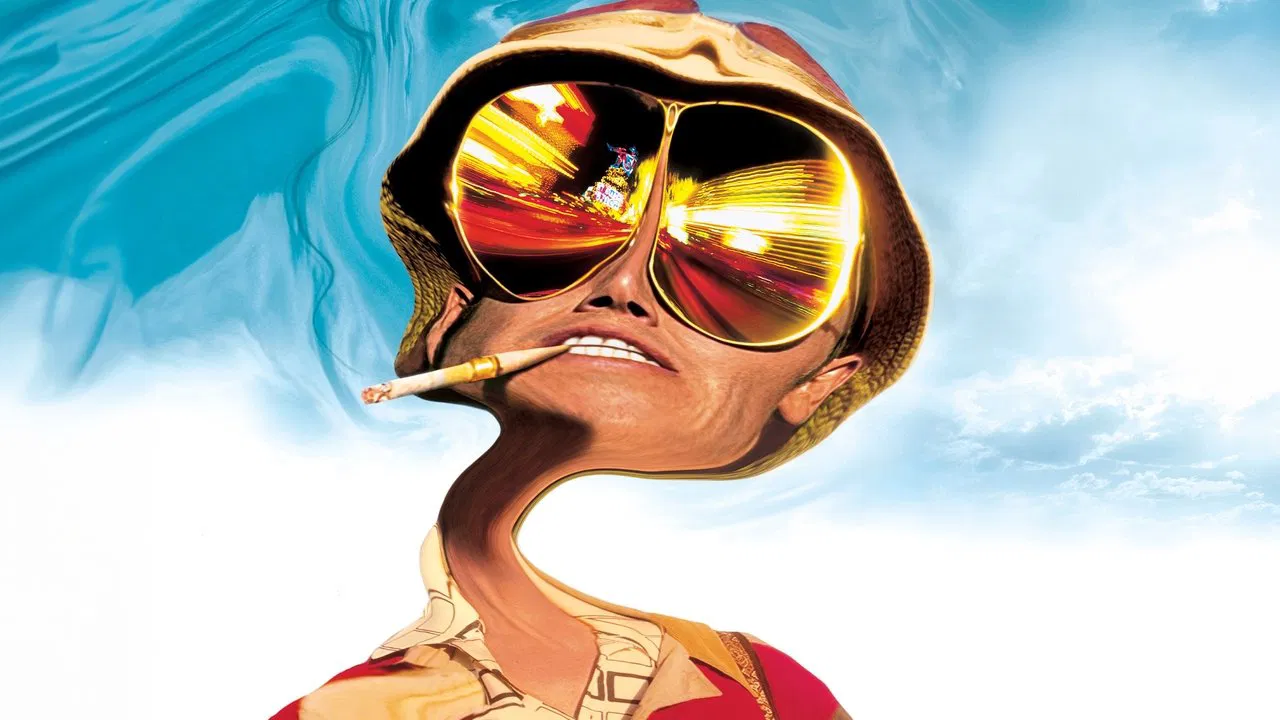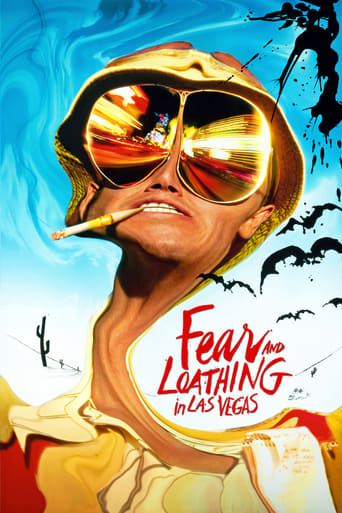

Gonzo Journalism and the way it can take a person along the journey is unique. Minted in this edition of the book by Mr Hunter S Thompson its a first for this genre and in my opinion, is one of the best revealing style of story creation.Love this beginning in Mr Depps' Acting.This movie is one of my all-time classics
... View MoreTo me, the best movies feel like dreams... or nightmares. Fear and Loathing in Las Vegas (1998) is very much the latter.It is fearlessly ugly. The canted, garish visuals and weird voice-over narration make you feel as though you're on drugs like the main characters, and the trip is not a good one. The world of this movie is threatening. It's a world of physical and moral decay, the graveyard of the American Dream that Raoul Duke is searching for throughout the story.Some may find this movie obnoxious or trashy, and there are moments where it leaves you utterly exhausted. If you are a person who gets what I have often heard termed "Gilliam fatigue," then Fear and Loathing will push you past your limit. But I like how it dares to be grotesque. Had the filmmakers been any softer or sentimental, the movie just would not work. The movie can be hard to stomach, but an appreciation for dark, twisted humor can help this bitter pill go down.
... View MoreWhen it comes to Terry Gilliam, I noticed a strange pattern, either you have fans who claim this is the greatest movie ever, or one of the Top 10... or you have those who give it a 1 or 2, calling it a tedious mess. And the same goes with the movie "Brazil". Why do we feel the need to make these movies more brilliant than what they seem, just because Gilliam took artistic liberties, just because they deal with true, contemporary themes and just because they're trippy as hell, doesn't make them "masterpieces" for all that. Sure, they're "special", but "special" doesn't make a film "great" from beginning to end, with your eyes glued to the screen. There are two kinds of movies if you asked me, those where you press the pause button when you got to pee, and those where you don't care because you want to get through it or you know it won't make a difference, it's not like you're going to miss a big plot point. "Fear and Loathing in Las Vegas" was perhaps the only film that made more sense the less I saw from it, which is a unique experience in its own way. I didn't hate the film, it's well-done, well- made, fast-paced, and Depp is as funny as Del Toro is annoying but we don't see Del Toro much time so it's okay. I'm okay with the film because I try to look at the half-full glass. But Gilliam has a tendency to make the same point over and over again... and no matter how aesthetically stylish it is, redundancy can get on some people's nerves, even when they try to focus on the good parts. My favorite film is still "The Fisher King" and it could have done without the needless hallucinations (you know, the Red Dragon...). I have a feeling that Gilliam is one hell of a writer and filmmaker seriously, but sometimes, he's like his worst enemy. And movies like "Fear and Loathing in Las Vegas" are kind of brutal, in the sense that they're confusing, but you're not even allowed to acknowledge it. I read all the comments, and it's like someone who thought the film was confusing as hell, just "didn't get it". Ebert takes a lot of the heat because he didn't get the film's brilliance. This is the man who considered "Leaving Las Vegas" the best film of 1995, "Crumb" was the second and the film also dealt with the influence of the LSD wave on American art in the 60's, Ebert also admired films like "Easy Rider" or "Apocalypse Now", he's a baby-boomer who gets more than any of us the pleas and pains of his generations, so I trust his capability to read between the lines and enjoy a psychedelic experience or a self-reflective portrayal of addiction that has a few social statement sot make. Maybe he did miss the point with "Fear and Loathing in Las Vegas", but I don't think the film ever has a point, it's about an experience, told from the same perspective by people living the same experience. It says a lot about but in such a way that it's only by going through the experience that you can appreciate it, it's a bizarre, tautological therefore pointless mess. I say 'pointless' because it's like the film is so intoxicated by its own exuberance, it doesn't even need an audience for that. It's like this guy who's being a total annoyance because he's too drunk, he makes unfunny jokes but he doesn't care because he's not aiming for laughs, he's wrapped up in his own twisted belief that he's the funniest guy in the world. So, you're the one supposed to drink so you can put yourself at his level and enjoy the jokes. I don't think a movie or any piece of art should rely its enjoyability on the use of some drugs or whatever to be fully appreciated. I don't think one should use tricks in order to enhance some creativity, if the real experience is integral to the one narrated through the film, what's the point? Now, I'm not trying to bash the film, if someone tells me it's a stinker, I'll probably defend it as a fan would do, but when I read that it's a masterpiece, I'm pointing out the weaknesses. I gathered that it was all about the self-reflexive experience, and there was no point other than the experience itself from these two guys' standpoint as a psychological microcosm of America's youth in the late 60's... but the film "Easy Rider" did pretty much the same thing without being too verbal or psychedelic in the treatment of the story. Gilliam is an artist, no doubt about that, and he's a man of fantasy, but fantasy is tricky: to make it work, you must treat it as seriously as another genre, if you handle fantasy in a fantasist way, it's very likely to disorient the viewers and undermine the fantasy meant as the core of the story, it's like directing style stealing the story's thunder.
... View MoreTerry Gilliam takes on the daunting task of adapting Hunter S. Thompson's psychedelic novel into an on screen feature, a task few directors including Martin Scorcese and Oliver a Stone attempted, but failed to make it pass the green lighting stage. The results aren't necessarily unsatisfactory, but show that some literacy works don't translate on screen efficiently, even with the most talented filmmakers working behind the camera. This black comedy starring Johnny Depp and Benicio Del Toro drags viewers through a loopy, psychedelic odyssey of a morally depraved duo who finds themselves intoxicated in what feels like more like a two-hour celebration of nearly drug in the book than a film with a cohesive story to follow. And with Terry Gilliam's inventive, but intoxicating visual methodology, it places it's characters through a loopy journey that is destined to leave audience either laughing hysterically or horribly disturbed by the vile nature of excessive drug escapades that pervades most of the film. The movie follows two stoners: the idiotic journalist Raoul Duke (played by Johnny Depp) and psychopathic lawyer Dr. Gonzo (played by Benicio De Toro) as they cruise in their red convertible through the deserts of Nevada and into the shiny streets of Las Vegas where he pursue their way to the American Dream, only to find themselves warped in a series of chaotic circumstances contributed by their compulsive drug addiction.If this film feels like a cerebral acid trip to you upon watching it, don't worry! You are not alone. With the characters letting wild on just about every drug in the book including pot, acid, heroin, cocaine, LCD, and what not; there is very little you can expect other than the feeling being sozzled out after taking a mind-altering substance. Terry Gilliam accomplishes this through a unique, but mind-bending technique involving visual distortion in intent of providing viewers with a feel of the condition Roaul and Gonzo are experiencing when drowning out in their excessive drug feud. During the scenes when the characters are experiencing withdrawals from hallucinagens, viewers watch as the camera bobbles at low angles back and worth, and the lighting obtains a reddish tint place an odd and uncomfortable feeling of intoxication. This technique is highly creative and shows the beauty of Terry Gilliam's immersive visual heft. Although the nightmarish imagery of Raoul's hallucinations such as the hotel clerk's head morphing into a monstrous alien creature is rather cheesy and unrealistic, it certainly paints a reasonable picture of the character's mental perspective. These scenes occasionally offer some good , but tend to be executed in an unsettling manner that towers surrealism over humor. By the end, the only humor we can manage to swallow out of these characters in some occasional solid one-liners but nothing memorable.While Terry Gilliam may have the visual style to compel the wild Las Vegas adventure, the film falls quite flat in the narrative department, offering an unwholesome mess of a plot with characters that are not only incredible foolish and vile in nearly every sense, but offer almost no backstory other than Raoul being a long-time journalist and Gonzo being an absent-minded lawyer, though it doesn't entirely defeat the likability of the characters. Their strange philosophy on the American Dream does provide at least some decent humor, but nothing clever. Johnny Depp and Benicio Del Toro are both funny every once in awhile, even in scenes when they're indulging in hardcore drug hysteria, and their performances are not bad to say the least. Raoul is arguably the most unusual and light- hearted role Depp has endure in his career, compared to his more clever outings. The same can probably be said for Toro as he is rarely accustomed to oddball, comedic roles. Though there performances don't link into the Oscar calibur, they do little to make up for the clobbered mess the plot delivers. The plot transcends through such choppy pacing it borders on the line of being incomprehensible. Although it seems Gilliam is trying to match the pacing with the psychedelic condition of the lead characters, the overall effect doesn't work in the way it should. Even though Gilliam supplements some liberties from Hunter S. Thompson's novel, it's clearly evident he's struggling to enhance the life and soul of Thompson's narration into from novel to the screen. Fear and Loathing in Las Vegas is probably not the most comfortable vehicle to sit through, nor does it demonstrate the best of Terry Gilliam's directorial talent, it still benefits from a humorous standpoint and provides a compelling cerebral that some will come to enjoy, while others will likely experience a sense of disgust.
... View More